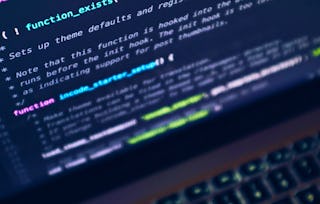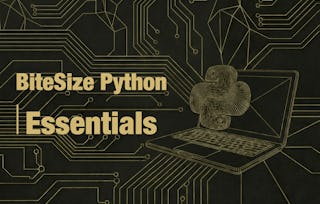This course focuses on mastering Python’s control flow mechanisms, including branching, looping, and functions. It covers essential concepts such as making decisions with if, if-else, and if-elif-else structures (branching), automating repetitive tasks using while and for loops (looping), and introduces functions as a higher-level form of flow control. Advanced topics like nested, hierarchical, and recursive functions are also explored, providing learners with tools to write organized, reusable, and efficient code.

BiteSize Python for Absolute Beginners: Flow Controls

BiteSize Python for Absolute Beginners: Flow Controls
This course is part of BiteSize Python for Absolute Beginners Specialization

Instructor: Di Wu
Included with
What you'll learn
Implement if, if-else, and if-elif-else to handle conditions and design branching logic for decision-making problems.
Use while and for loops, apply break and continue, and solve practical problems by automating tasks with loops.
Implement functions with various parameters, return types, and recursion, comparing iterative and recursive solutions for efficiency.
Skills you'll gain
Details to know

Add to your LinkedIn profile
4 assignments
See how employees at top companies are mastering in-demand skills

Build your subject-matter expertise
- Learn new concepts from industry experts
- Gain a foundational understanding of a subject or tool
- Develop job-relevant skills with hands-on projects
- Earn a shareable career certificate

There are 4 modules in this course
This module introduces the concept of branching in Python, allowing programs to make decisions based on conditions. It covers different types of branching, including optional branching using if, alternative branching with if-else, and multi-branching with if-elif-else. Real-life examples will be provided to show how branching can be applied to solve practical problems.
What's included
5 readings1 assignment4 ungraded labs
This module explores looping constructs in Python, focusing on condition-based loops using while and count-based loops using for. It introduces loop control mechanisms like break and continue to modify loop behavior. The module also includes real-life case studies to demonstrate how loops are used to solve repetitive tasks efficiently.
What's included
1 reading1 assignment4 ungraded labs
This module introduces the concept of functions in Python, explaining their importance in organizing and reusing code. It covers different types of functions, from those with no parameters to those with multiple parameters, and explains the distinction between arguments and parameters. Additionally, it explores default values, functions that return values of various types (numeric, string, boolean), and those that return multiple values.
What's included
1 reading1 assignment11 ungraded labs
This module explores advanced function concepts in Python, such as nested functions, hierarchical functions, and recursive functions. It explains how functions can be organized within other functions (nested) and how hierarchical function calls work. It also provides a deep dive into recursion, showing how functions can call themselves to solve complex problems.
What's included
1 reading1 assignment3 ungraded labs
Earn a career certificate
Add this credential to your LinkedIn profile, resume, or CV. Share it on social media and in your performance review.
Instructor

Offered by
Explore more from Data Analysis

University of California, Davis
 Status: Free Trial
Status: Free Trial Status: Free Trial
Status: Free TrialUniversity of Colorado Boulder
 Status: Free Trial
Status: Free TrialUniversity of Colorado Boulder
Why people choose Coursera for their career

Felipe M.

Jennifer J.

Larry W.

Chaitanya A.

Open new doors with Coursera Plus
Unlimited access to 10,000+ world-class courses, hands-on projects, and job-ready certificate programs - all included in your subscription
Advance your career with an online degree
Earn a degree from world-class universities - 100% online
Join over 3,400 global companies that choose Coursera for Business
Upskill your employees to excel in the digital economy
Frequently asked questions
To access the course materials, assignments and to earn a Certificate, you will need to purchase the Certificate experience when you enroll in a course. You can try a Free Trial instead, or apply for Financial Aid. The course may offer 'Full Course, No Certificate' instead. This option lets you see all course materials, submit required assessments, and get a final grade. This also means that you will not be able to purchase a Certificate experience.
When you enroll in the course, you get access to all of the courses in the Specialization, and you earn a certificate when you complete the work. Your electronic Certificate will be added to your Accomplishments page - from there, you can print your Certificate or add it to your LinkedIn profile.
Yes. In select learning programs, you can apply for financial aid or a scholarship if you can’t afford the enrollment fee. If fin aid or scholarship is available for your learning program selection, you’ll find a link to apply on the description page.
More questions
Financial aid available,

